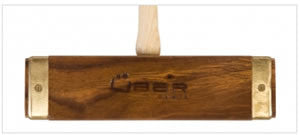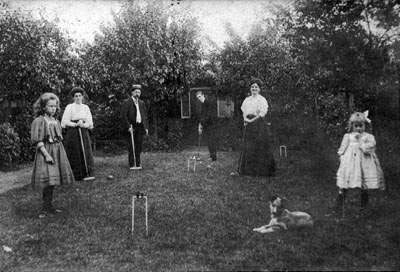Croquet Mallet Shafts - how to choose the most suitable
When choosing a croquet mallet you have a range of options for the shaft. From material to shape, even if you are just looking to buy a croquet set for recreational use, there are decisions to be made!
A croquet mallet should give you both power and control. There is a trade-off between the two, and mallets have changed significantly over the years to help players achieve more power whilst still retaining the control as well.
If you are choosing a croquet set for recreational games, then elements such as strength and durability my well be more important. If your friends and family are using a croquet set in the garden, or on a makeshift lawn, then cost-effectiveness will no doubt play a big part too. Naturally the “better” the mallet, the higher the cost
This article is going to focus exclusively on the shaft of the croquet mallet (see other articles for more information about the head) and will provide some background information and guidance based on what the croquet mallet (or croquet set) is going to be used for.
Ideal characteristics of the croquet mallet shaft:
- The shaft should let you generate power but there is no point in having any weight in it. The weight of the mallet should be concentrated in the head.
- The strength of the shaft is crucial. A shaft that is not strong is going to break easily when you try and generate any kind of power.
- There is another compromise here. A shaft that is rigid will provide more control but if it is too rigid then that is not beneficial either (and hitting the ball can cause significant jarring)
- No twist. The ball leaves the mallet perpendicular to the head, so if the head twists at all then the ball is likely to go off-course
Weight:
The overall weight of a mallet should be around 3lbs, so you are looking for a shaft that is as light as possible. Most of the mallets we sell are made of wood, which is a perfectly reasonable material, but again, different types of wood can provide lower weight, but better durability and a good compromise for flexibility.
Ash is a strong, and very durable wood type. The grain is fairly straight which is very important for its characteristics. Because of its strength and durability, ash wood has an range of uses and is perfectly suited for our better quality croquet sets
Other light weight materials include fibre glass and carbon. As mentioned though ash handles are the most cost-efficient and are actually also used by a majority of croquet players
Strength
This is where traditional hardwood can provide a problem – but because of the straight grain of Ash, it provides a great solution that still has the strength that is necessary. Most croquet sets don’t come with anything but hardwood or Ash handles, but better croquet mallets can be made using a variety of very strong materials.
Rigidity
Generally the composite (non-natural) materials are the most rigid, and so can provide the more uncomfortable play. Ash however is a natural timber and provides some element of flexibility, even though not at the loss of too much control.
No Twist
The twisting element can be dealt with by the shape of the shaft. Although most recreational croquet mallets have round shafts, which are perfectly sufficient for a regular game of croquet, if you are looking for more accuracy and control, the shape should be anything but round. It can vbe octagonal, or square with rounded corners
Summary
So what should you choose? Well, it depends very much what you are looking for. For recreational use standard round wood shafts are perfectly adequate. They will keep the cost down, and where the power and direction are not the main factors there is no need to spend more! For more durability and strength our croquet sets come with mallets with Ash shafts.. These tend to last longer, and provide a better quality mallet. If the shaft or even just the handle are octagonal then this is even better. If you are very serious about your croquet then it might be worth thinking about composite materials.
As a rough guideline costing ranges are as follows (dependent on other factors as well):
1) Standard round hardwood shaft - £30
2) Ash handle - from £60
3) Composite (with quality head) - from £100
Click here to view the mallets we stock - we wish you the best of luck with your mallet choice!
- Andre Boeke



